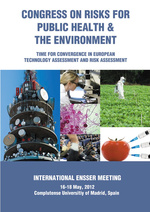Press Release: Glyphosate: EU neglects obvious precautionary duty to ban it, scientists say
Glyphosate: EU neglects obvious precautionary duty to ban it, scientists say While the EU hesitates about yet another re-authorisation of glyphosate, the science is quite clear enough for this decision, according to the European Network of Scientists for Social and Environmental Responsibility (ENSSER). The herbicide ingredient can give rise to toxic effects and serious … Read more

